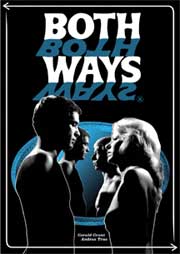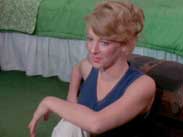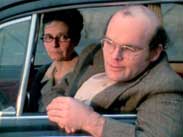 BOTH
WAYS (1975)
BOTH
WAYS (1975)Director: Jerry Douglas
Vinegar Syndrome
 BOTH
WAYS (1975)
BOTH
WAYS (1975)A bisexual lawyer tries to have it BOTH WAYS in Vinegar Syndrome's DVD of this daring seventies porn effort.

Harvard lawyer Donald Wyman (Gerald Grant, NAKED CAME THE STRANGER) has a nice suburban life in Connecticut with loving wife in Janet (Andrea True, THE SEDUCTION OF LYN CARTER) and young son David. He loves equally (no more or less than his family) his younger Yale college student lover Gary (Dean Tait, THE DEVIL INSIDE HER) who he met in a leather bar and secretly meets in a hideaway apartment during the work week in New York. Donald likes things the way they are and it is getting harder to maintain his double life. Janet rightfully believes that he is having an affair but believes it is because he no longer desires her. Gary is tired of being a dirty little secret and wants a more open relationship with Donald. His two worlds come together when friends Hank (Bill Morgan, ONCE OVER NIGHTLY) and Louise (Darby Lloyd Rains, EVERY INCH A LADY) – also known as "those sodomites next door" according to the Wymans' housekeeper Pauline (Katherine Miles) – throw a party and Gary shows up as a bartender hoping to make some extra money. Janet is lead off the scent when she badgers Donald into an "orgy" (actually a four-way) with Hank and Louise, but his overenthusiastic performance with Louise has her thinking it is just her that he no longer desires. When Gary tries to initiate contact closer to home, the well-intentioned prying of Pauline and mystery-reading busybody antiques dealer Irwin (Jake Everett) over what they believe is a blackmail attempt. Their meddling only serves to make Janet more suspicious about Donald's friendship with Gary, and Donald will go to tragic extremes to keep his secret.
 Tackling
the concept of bisexuality during the sexual revolution – a topic not
only socially controversial but a potential turn-off to the raincoat crowd (at
least when it involves two men) – BOTH WAYS is equal parts outlandish
soap opera and poignantly observant. The film does not equate Donald's inability
to choose one sex over the other with the emotional immaturity symbolized by
his fondness for balloons and his recreational use of the tire swing in his
yard so much as his unwillingness to choose between wife and lover. Most of
the sex scenes last long enough to make a point or are broken up by montage,
with the only lingering sex scene between Donald and Louise since the latter
goes overboard to prove himself after his wife has questioned his sex drive
in front of his two friends. The heat of said sex scene is dissipated by cutaways
to Hank and Janet who are distracted from their attempts to enjoy each other
by the Donald's performance and Louise's enjoyment of it. The more frank discussions
have a soapy feel about them but are revealing of the complexity and ambiguity
of attitudes towards sexual exploration in the 1970s (although Hank offends
Gary during the party with off-color jokes about "queers", he is surprisingly
non-judgmental when Donald reveals that his idea of having it "both ways"
means another man rather than another woman). The mysterious Grant appeared
in three adult features, two for Radley Metzger with SCORE – for which
writer/director Jerry Douglas (THE BACK ROW) had written the original state
play – casting him as a more jaded bisexual who sets his sights on Calvin
Culver/Casey Donovan and engaging in a single encounter with Rains in NAKED
CAME THE STRANGER. His only other credited role is a supporting bit in the New
York scenes of Umberto Lenzi's EATEN ALIVE. Just a year away from her disco
one hit wonder "More More More (How Do You Like It?)", True is not
a great actress but looks a little like Jennifer Welles (CONFESSIONS OF A YOUNG
AMERICAN HOUSEWIFE) from some angles.
Tackling
the concept of bisexuality during the sexual revolution – a topic not
only socially controversial but a potential turn-off to the raincoat crowd (at
least when it involves two men) – BOTH WAYS is equal parts outlandish
soap opera and poignantly observant. The film does not equate Donald's inability
to choose one sex over the other with the emotional immaturity symbolized by
his fondness for balloons and his recreational use of the tire swing in his
yard so much as his unwillingness to choose between wife and lover. Most of
the sex scenes last long enough to make a point or are broken up by montage,
with the only lingering sex scene between Donald and Louise since the latter
goes overboard to prove himself after his wife has questioned his sex drive
in front of his two friends. The heat of said sex scene is dissipated by cutaways
to Hank and Janet who are distracted from their attempts to enjoy each other
by the Donald's performance and Louise's enjoyment of it. The more frank discussions
have a soapy feel about them but are revealing of the complexity and ambiguity
of attitudes towards sexual exploration in the 1970s (although Hank offends
Gary during the party with off-color jokes about "queers", he is surprisingly
non-judgmental when Donald reveals that his idea of having it "both ways"
means another man rather than another woman). The mysterious Grant appeared
in three adult features, two for Radley Metzger with SCORE – for which
writer/director Jerry Douglas (THE BACK ROW) had written the original state
play – casting him as a more jaded bisexual who sets his sights on Calvin
Culver/Casey Donovan and engaging in a single encounter with Rains in NAKED
CAME THE STRANGER. His only other credited role is a supporting bit in the New
York scenes of Umberto Lenzi's EATEN ALIVE. Just a year away from her disco
one hit wonder "More More More (How Do You Like It?)", True is not
a great actress but looks a little like Jennifer Welles (CONFESSIONS OF A YOUNG
AMERICAN HOUSEWIFE) from some angles.

Scanned and restored in 2K from the original 35mm camera negatives, Vinegar Syndrome's progressive, non-anamorphic 1.33:1 fullscreen presentation looks only as good as the original cinematography. Coverage of the sex scenes from all focal lengths is sharp and defined as are close-up inserts, while location scenes and even some long shots within interior scenes are more lazily focused as if they were an afterthought (with a couple exterior scenes looking like either 16mm blow-ups or perhaps optically zoomed in at the time of post-production). The Dolby Digital 1.0 mono track is more consistent overall.
 The
film is accompanied by an audio commentary by director Jerry Douglas in which
he describes it as a lost film because he was unable to find materials for the
film when his business partner died in the nineties, and the moderator reveals
that the previously available VCA version removed much of the material featuring
the character of Donald's son due to the studio's nervousness about featuring
a child in a porn film (even though he is in no way involved in any potentially
objectionable scenes). Douglas reveals that the parents knew full well the nature
of the film and had no objections, and praises Grant's ability to elicit a performance
out of him. He also discusses the inspiration for the story in a San Francisco
pickup that he discovered had a wife and child and was living out of the truck
of his car going between home with his family and a lover (he got caught when
he put his lovers car on the family insurance). He discusses the risks of shooting
on location, including filming on the Yale and Columbia campuses and getting
a supermarket chain to allow them to shoot a scene for an adult film. He also
recalls that bisexual pornography was not yet considered a viable genre, and
he felt it was a mistake to begin the film with a gay sex scene which had some
of the viewing audience out the door (the poster art does foreground Grant and
True). Tait and a number of the supporting cast members – including Everett
and Miles – became acquainted with Douglas Off Broadway while a pre-disco
fame True was nevertheless considered a big name at the time. Douglas takes
the blame for the jumpy sex scenes, conceding that he was still learning at
the time how to shape not only a narrative with sex scenes but also the structure
of the sex scenes themselves. The only other extra is the film's theatrical
trailer (3:14). (Eric
Cotenas)
The
film is accompanied by an audio commentary by director Jerry Douglas in which
he describes it as a lost film because he was unable to find materials for the
film when his business partner died in the nineties, and the moderator reveals
that the previously available VCA version removed much of the material featuring
the character of Donald's son due to the studio's nervousness about featuring
a child in a porn film (even though he is in no way involved in any potentially
objectionable scenes). Douglas reveals that the parents knew full well the nature
of the film and had no objections, and praises Grant's ability to elicit a performance
out of him. He also discusses the inspiration for the story in a San Francisco
pickup that he discovered had a wife and child and was living out of the truck
of his car going between home with his family and a lover (he got caught when
he put his lovers car on the family insurance). He discusses the risks of shooting
on location, including filming on the Yale and Columbia campuses and getting
a supermarket chain to allow them to shoot a scene for an adult film. He also
recalls that bisexual pornography was not yet considered a viable genre, and
he felt it was a mistake to begin the film with a gay sex scene which had some
of the viewing audience out the door (the poster art does foreground Grant and
True). Tait and a number of the supporting cast members – including Everett
and Miles – became acquainted with Douglas Off Broadway while a pre-disco
fame True was nevertheless considered a big name at the time. Douglas takes
the blame for the jumpy sex scenes, conceding that he was still learning at
the time how to shape not only a narrative with sex scenes but also the structure
of the sex scenes themselves. The only other extra is the film's theatrical
trailer (3:14). (Eric
Cotenas)